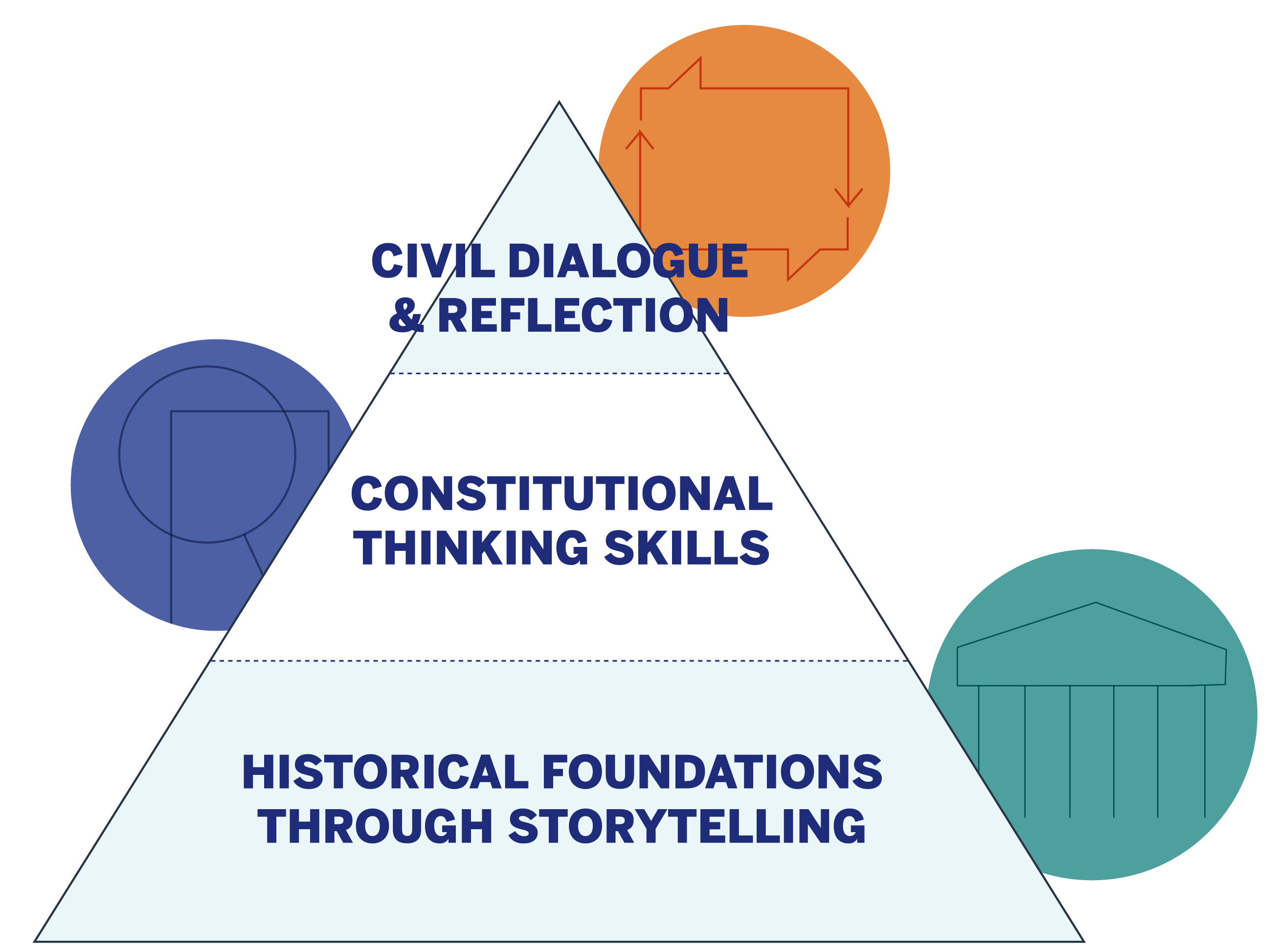At the National Constitution Center, we value civil dialogue, which empowers students to speak about constitutional and historical topics in ways that remain civil, respectful, and reflective. As you prepare to discuss these topics in your classroom, we encourage you to establish norms such as:
- Stay calm
- Listen patiently
- Listen actively
- Don’t speak twice until everybody has spoken once
You can find more support for establishing norms and civil dialogue practices in our Civil Dialogue Toolkit.
Big Constitutional Questions
How did Enlightenment and classical thinkers shape the Constitution? How do their ideas still guide American government today?
Headline Story
In 1787, delegates in Philadelphia drew on centuries of political thought to design a new system of government. From Thucydides’ history of war and power, to Montesquieu’s analysis of separation of powers, to George Mason’s demand for a bill of rights, the framers borrowed and debated ideas that continue to influence constitutional law and civic life today. Two scholars Paul Rahe (Hillsdale College) and Jonathan Gienapp (Stanford University) revisit these intellectual foundations in clips (located in primary source section) from our We the People podcast. Rahe highlights Montesquieu’s Spirit of the Laws, which defined republics, monarchies, and despotisms and inspired America’s separation of powers. Gienapp examines George Mason’s Objections, a pivotal anti-Federalist critique that paved the way for the Bill of Rights. These insights reveal that the Constitution is not a static artifact but a landmark document that continues to inspire conversations between past and present.
Amendment / Clause Focus
- Article I, Section 8 Necessary & Proper Clause (“Elastic Clause”)
- Separation of Powers Implied in Articles I–III
- Bill of Rights, first 10 amendments added in 1791
Scholar Perspectives
|
Scholar |
Key Ideas & Quote |
Why It Matters |
|
Paul Rahe (Montesquieu) |
“He distinguishes between monarchies, republics and despotism… the English form of government—a republic in the guise of a monarchy—becomes the model in the United States.” |
The framers adopted separation of powers and crafted a government of limited powers. |
|
Jonathan Gienapp (George Mason) |
“There is no declaration of rights… This government will commence in a moderate aristocracy… and then terminate in one or the other.” |
Mason’s objections became the blueprint for Anti-Federalists and helped lead to the Bill of Rights. |
Primary Source Spotlight (Embedded Excerpts)
Montesquieu, Spirit of the Laws: Book XI, Ch. 6: “The English constitution is… a republic, disguised under the form of a monarchy.”
George Mason, Objections (1787): “There is no declaration of rights… This government will commence in a moderate aristocracy.”
Think, Talk, Create
Student Questions
- What connections does Paul Rahe make between Montesquieu’s philosophies on government and the U.S. Constitution? Why is it important to understand how Enlightenment thinkers shaped the creation of the Constitution?
- Jonathan Gienapp selected George Mason’s text to emphasize the arguments of Anti-Federalists. What did Mason argue, and how did the establishment of a bill of rights help address concerns about the powers of the new national government?
- As we celebrate the Constitution’s 238th birthday, how do the ideas of Montesquieu and Mason continue to influence our understanding and interpretation of the U.S. Constitution in 2025?
Student Choice Options

- Illustrate a visual timeline that tells the story of the creation of the U.S. Constitution and meaningfully highlights the influences of Montesquieu and George Mason.
- Complete the Window Notes organizer to consider the facts, feelings, questions, and connections that come up as you listen to each podcast segment.
- Reflect on the impact of Montesquieu and Mason on our contemporary understanding of the U.S. Constitution by freewriting your response in a journal. Possible class extension: Engage in a fishbowl-style dialogue where students can share their reflections with one another.
Beyond the Headlines
- Full Podcast Episode: The Intellectual Inspirations Behind the Constitution (Sept 8, 2022) – Excerpts [1:01:14–1:07:20] and [00:43:03–00:50:29]
- Founders’ Library Primary Sources: Bacon, Hobbes, Harrington, Locke, Hume, Smith, Montesquieu, Dickinson, Cushing, Iredell, Mason, Webster, Madison, Hamilton
- NCC Resources: Constitution Day Hub, Civil Dialogue Toolkit, Town Hall archive







